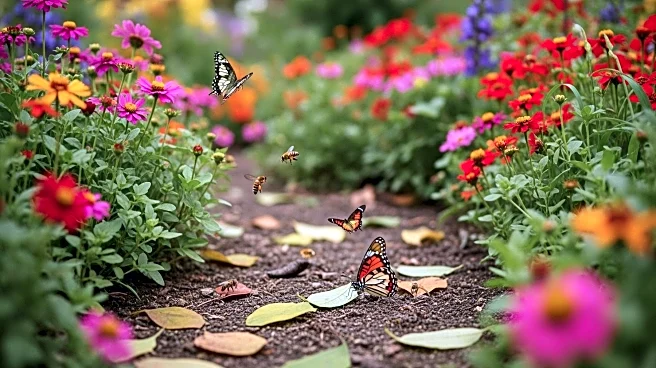What is the story about?
What's Happening?
Environmental experts are encouraging homeowners to leave fallen leaves on their lawns as a means to support pollinator habitats. According to Kaitlin Stack Whitney, assistant professor at the Stack/Whitney Collaborative of Entomology, Environment and Technology at RIT, leaf litter provides essential protection and insulation for various beneficial insects, including butterflies, bees, and moths. These insects rely on leaves to overwinter, with species such as Isabella tiger moths, Luna moths, and Black swallowtails using leaf litter for hibernation and camouflage. The practice of leaving leaves can also benefit grass by boosting nutrition and suppressing weeds as they decompose. However, experts caution against excessive leaf coverage, which can block sunlight and damage turf grass.
Why It's Important?
The preservation of leaf litter is crucial for maintaining biodiversity and supporting the ecosystem. By providing a habitat for pollinators, homeowners can contribute to the health of local food webs, which include birds and other wildlife that rely on insects as a food source. Additionally, leaving leaves on the ground can reduce waste, as yard waste is banned from Monroe County landfills. This practice aligns with sustainable waste management efforts, as it prevents contamination and promotes composting. The initiative also highlights the importance of viewing residential spaces as natural environments that can support ecological functions.
What's Next?
Homeowners are encouraged to find a balance between maintaining their yards and supporting ecological health. This includes removing leaves from pathways to prevent slick surfaces while using them as mulch around trees and shrubs or for composting. Monroe County offers composting facilities for yard waste, providing residents with access to free compost at the Ecopark. As awareness grows, more communities may adopt similar practices to enhance local biodiversity and reduce landfill waste.
Beyond the Headlines
The movement to preserve leaf litter reflects a broader shift towards sustainable landscaping practices that prioritize ecological health over traditional aesthetics. This approach challenges conventional notions of tidiness and encourages a reevaluation of how residential spaces can contribute to environmental conservation. By fostering habitats for pollinators, communities can play a role in addressing broader environmental challenges, such as declining insect populations and habitat loss.

















